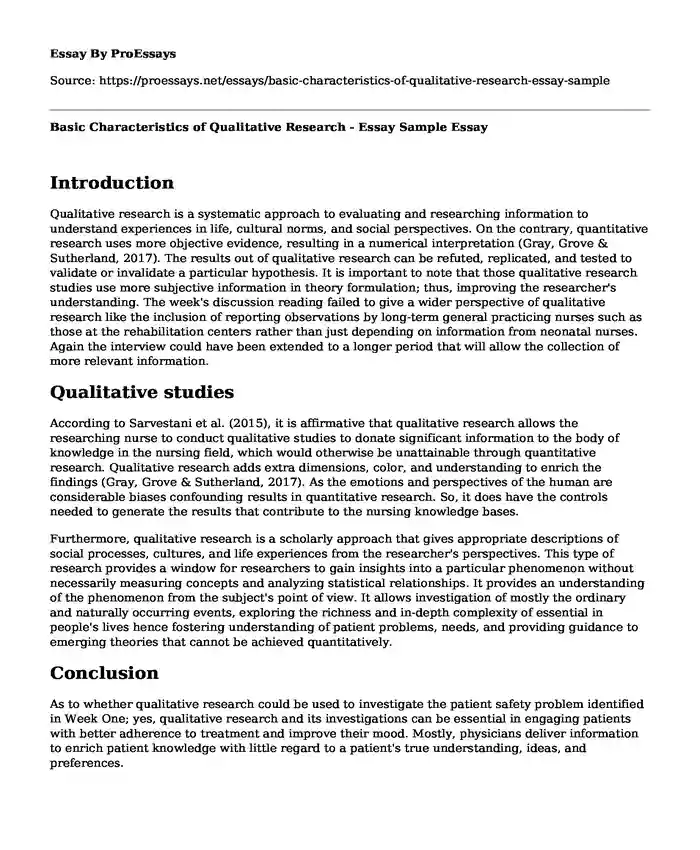Introduction
Qualitative research is a systematic approach to evaluating and researching information to understand experiences in life, cultural norms, and social perspectives. On the contrary, quantitative research uses more objective evidence, resulting in a numerical interpretation (Gray, Grove & Sutherland, 2017). The results out of qualitative research can be refuted, replicated, and tested to validate or invalidate a particular hypothesis. It is important to note that those qualitative research studies use more subjective information in theory formulation; thus, improving the researcher's understanding. The week's discussion reading failed to give a wider perspective of qualitative research like the inclusion of reporting observations by long-term general practicing nurses such as those at the rehabilitation centers rather than just depending on information from neonatal nurses. Again the interview could have been extended to a longer period that will allow the collection of more relevant information.
Qualitative studies
According to Sarvestani et al. (2015), it is affirmative that qualitative research allows the researching nurse to conduct qualitative studies to donate significant information to the body of knowledge in the nursing field, which would otherwise be unattainable through quantitative research. Qualitative research adds extra dimensions, color, and understanding to enrich the findings (Gray, Grove & Sutherland, 2017). As the emotions and perspectives of the human are considerable biases confounding results in quantitative research. So, it does have the controls needed to generate the results that contribute to the nursing knowledge bases.
Furthermore, qualitative research is a scholarly approach that gives appropriate descriptions of social processes, cultures, and life experiences from the researcher's perspectives. This type of research provides a window for researchers to gain insights into a particular phenomenon without necessarily measuring concepts and analyzing statistical relationships. It provides an understanding of the phenomenon from the subject's point of view. It allows investigation of mostly the ordinary and naturally occurring events, exploring the richness and in-depth complexity of essential in people's lives hence fostering understanding of patient problems, needs, and providing guidance to emerging theories that cannot be achieved quantitatively.
Conclusion
As to whether qualitative research could be used to investigate the patient safety problem identified in Week One; yes, qualitative research and its investigations can be essential in engaging patients with better adherence to treatment and improve their mood. Mostly, physicians deliver information to enrich patient knowledge with little regard to a patient's true understanding, ideas, and preferences.
References
Gray, J. R., Grove, S. K. & Sutherland, S. (2017). Burns and Grove's the practice of nursing research: Appraisal, synthesis, and generation of evidence. St. Louis, Missouri: Elsevier.
Sarvestani, S. R., Moattari, M., Nasrabadi, A. N., Momennasab, M., & Yektatalab, S. (2015). Challenges of nursing handover: A qualitative study. Clinical nursing research, 24(3), 234–252.
https://doi.org/10.1177/1054773813508134.
Cite this page
Basic Characteristics of Qualitative Research - Essay Sample. (2023, Dec 12). Retrieved from https://proessays.net/essays/basic-characteristics-of-qualitative-research-essay-sample
If you are the original author of this essay and no longer wish to have it published on the ProEssays website, please click below to request its removal:
- Disaster Recovery Plans Research Paper
- Malcolm Gladwell's 'Java Man' Analysis Paper Example
- How Nurses Are Solving Some of Primary Care's Most Pressing Challenges? - Paper Example
- Research Paper on Obesity in UAE (United Arab Emirates)
- Essay Sample on Improving Patient Quality and Safety: Guidelines & Evidence-Based Practices
- Paper Sample on Seniors in Canada: Healthier and Longer Lives Thanks to Gov't Care
- Essay Sample on Quit Smoking Now: Regain Your Health and Avoid Heart Disease Death







